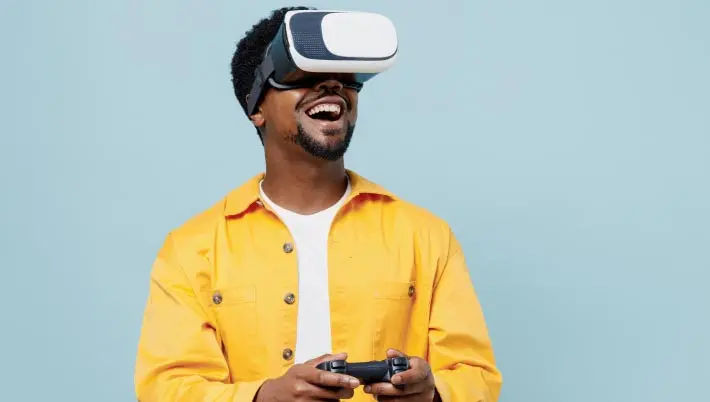Online casino game developers are exploring how they can adapt casino games and online casino no deposit bonus promotions to the upcoming Virtual Reality technology to create interactive virtual realities that will enhance the entire casino experience. Virtual Reality at the online casino will be a game-changer and will, casino consultants believe, transform the ways that players interact with digital gambling.
Grande Vegas as well as other top online casino platforms is considering how to adopt the new VR technology as it strives to bridge the gap between the immersive, social atmosphere of a physical casino and the convenience of online play.
What is Virtual Reality?
Virtual Reality involves the use of advanced computer-generated technology that can create an interactive virtual environment that replaces the real one. The goal of VR is to allow the user to interact with a fictional world that their senses tell them is "real." If you're using a VR headset, for example, through haptic sensations and touch simulation, you may be able to hear, see and possible even "touch" various virtual objects.
There are three basic types of VR
- Non-immersive VR
- Semi-immersive VR
- Fully immersive VR
Virtual reality is generally associated with gaming but it can also be applied to other industries including patient education and medical training in healthcare, vehicle safety in the auto industry, creating more immersive and engaging shopping experiences, building brands and connecting with audiences for marketing, give virtual property tours to potential real estate customers, enhance entertainment events and bolster high-risk learning sessions (i.e. for pilots, surgeons, etc.
3D Environment for Gamers
For gamers, the draw of VR is that it creates a fully-immersive 3D environment. Instead of playing on a flat screen, you walk around a virtual casino floor, explore different rooms and feel the ambiance of the casino with authentic lighting and sound effects.
Dedicated gamers enjoy the ability to engage with games in a tangible way that is allowed through VR. You can "sit" at a blackjack table, "pull" a lever on a slot machine, "spin" the roulette wheel or build your poker hand. Tactile engagement makes the game feel more real than you could experience by simply clicking a mouse.
VR also gives you the chance to socialize with others through avatars, voice chats and leaderboards. Traditional online gambling has, until now, been a solitary experience but now there's an opportunity to enjoy an element of interactivity that makes online gambling as much of a social event as you'd have if you played at a Vegas casino.
Why Now?
VR has been available for several years but the integration options for online gambling is now available thanks to a number of new opportunities. For one thing, the cost of quality VR headsets has dropped significantly which means that the technology is more accessible to more people. There have been advances in rendering and processing power which is allowing the creation of more realistic and detailed virtual environments that run smoothly without lag.
VR is an integral part of the "metaverse" concept which introduces new possibilities. In the metaverse, casino security and transparency in transactions is enhanced for crypto users so players can own and trade virtual assets (NFTs). Presently such transactions are customary at poker tables but if the option becomes available at VR casinos it can give players a sense of digital ownership which is popular in video gaming circles.
Challenges for VR at Online Casinos
Casino observers are fascinated with the vision of a fully immersive VR casino floor but there are challenges to making it happen. The technology still has to overcome several hurdles. They include:
- The high cost and accessibility of hardware is probably the single biggest barrier to bringing VR to the online casino. Unlike traditional online casinos, which only require a smartphone or computer, a VR casino demands specialized and often expensive hardware. Headsets still represent a significant investment and many VR headsets require a connection to a powerful computer, one that casual gamblers generally do not access. Developers aren't eager to invest large sums in creating a VR casino that has a limited user base.
- There's a significant learning curve that needs to be overcome so that users can maximize the VR experience. If not used correctly, some players may experience "cybersickness" – a motion sickness-type feeling which can be disorienting and uncomfortable. In addition, navigating a 3D space and interacting with virtual objects using hand controllers is not intuitive for many people so players who just want to enjoy their game may feel frustrated. Setting up a VR space can be a time-consuming process that goes against the "instant play" convenience of traditional online casinos.
- The game library for VR casino games is, at present, quite limited. There are few available VR games compared to the thousands of slots and table games available on a traditional online casino platform. This limited selection may deter many gamers.
VR promises a future of truly immersive online gambling but, at present, it's a niche sector. The industry continues to work on solutions and many observers believe that, as technology becomes more affordable and user-friendly, the dream of a widely accessible VR casino will become a reality in the near future.


